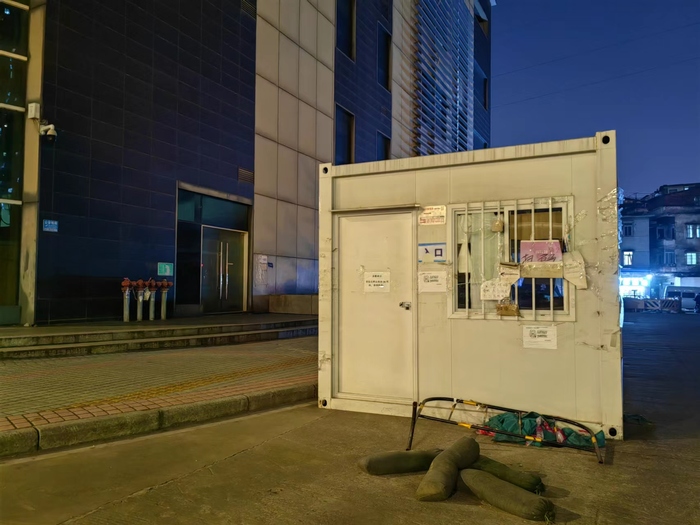With Covid controls gone, PCR tests are no longer required and an entire ad-hoc industry is ailing.

A man walks pass an abandoned Covid testing booth in Shanghai. Photo by Xu Lingchao
By ZHANG Xilong
On the day China scrapped Covid-testing, a sanitation worker in Guangzhou came to line up at a booth. She had come to have her throat swabbed every day for most of the year, but the booth was closed, and a worker walked around with a loudhailer which shouted “no more PCR.”
Those waiting were at a loss. After almost three years of “zero-Covid,” China abandoned the plan in December. People are still trying to get their heads around.

In May, Vice Premier SUN Chunlan said Covid-19 testing booths would be within a 15-minute walking distance of everyone in all major cities. Negative nucleic acid results were a must-have for school, work, shopping or dining out.
That was when YU Zifei bought five Covid-19 testing booths as an investment. “It was a failure from the beginning, one of them was out of use after only seven days,” he said.
Now with Covid controls gone, PCR tests are no longer required. All of Yu’s booths are for sale online. Each booth cost 15,000 yuan (US$2,200) in May. They are priced now at 8,000 yuan.
In Shanghai, booths remain with sampling rods and masks still piled inside, the doors locked. Some health commissions say they have modified some booths into fever clinics or pharmacies. But most booths, like Yu’s, are simply being dumped. Yu got no offers because so many people like him are trying to sell their booths, so he dropped the price.
“Name your price, I’ll go with it if it is not a joke,” he said.
While individuals like Yu took a toll, companies making these booths said the damage is “manageable.” Guangzhou Falilai expanded into Covid booths last year. The company makes toilets or temporary housing with containers.
“Business was good in the summer, but even then, booths were only ten percent of our total business,” XIA Genyin, a Falilai manager said. “We may lose some money, but that’s a minor loss.”
When Covid tests were scrapped at airports, WU Le in Northwest China’s Gansu Province was laid off. In October, she left Beijing where she was a nurse in a private hospital. looking for a similar job back home, Wu ended up swabbing people’s throats.
“Jobs are hard to come by, I got 18 yuan (US$2.50) an hour, with a dorm and meals,” said Wu. “At the time they didn’t need nurses in hospitals.”
For two months, Wu felt like a worker at an assembly line, mechanically repeating the same moves again and again. “Unpackge a swab, swab someone’s throat, put the swab into a tube, place the tube together,” she said.
Wu is delighted to be sacked, after two months of pointless work, but she is still worried about a stable job. She is now staying at her friends’ place, submitting her CV everywhere. She still wants to be a nurse or work in a medical service company.
In the labs where the swabs were sent for testing, controversy and conspiracy theories meet. Guangzhou media Time Weekly reported that after mass Covid tests were scrapped, the salary of lab workers was slashed from 30,000 yuan to 10,000 yuan. Many testing labs have financial problems, and some were accused of meddling with testing results.
LIN Song worked for a lab as an accountant, and said the salaries of a test worker in the lab ranged from 3,000 yuan to 8,000 yuan. “But the bonus was crazy. Some got more than 100,000 yuan a month if the sample size was big enough,” Lin said.
CHEN Jing works for a diagnostics company. She said after Covid testing was scrapped, her salary was halved.
“So far, they are not laying off employees, but some heads will roll soon,” said Chen. “The bosses will try to make up for the loss of Covid testing.”
DIAO Zhenxuan used to work in a lab in Nanjing for up to 100 yuan per hour. “There were never enough testers so they kept hiring,” said Diao. “And now all is over.”
He now works as a part-time teacher. “I’ll never put on that hazmat suit again,” he said. “It was not a pleasant job at all. I could not eat or drink or take a pee for seven hours in that lab.”
From emerging business to bust, Covid testing booths lived for three short years.
“I wonder in 30 years, how I will describe my previous job to my children,” said Diao.